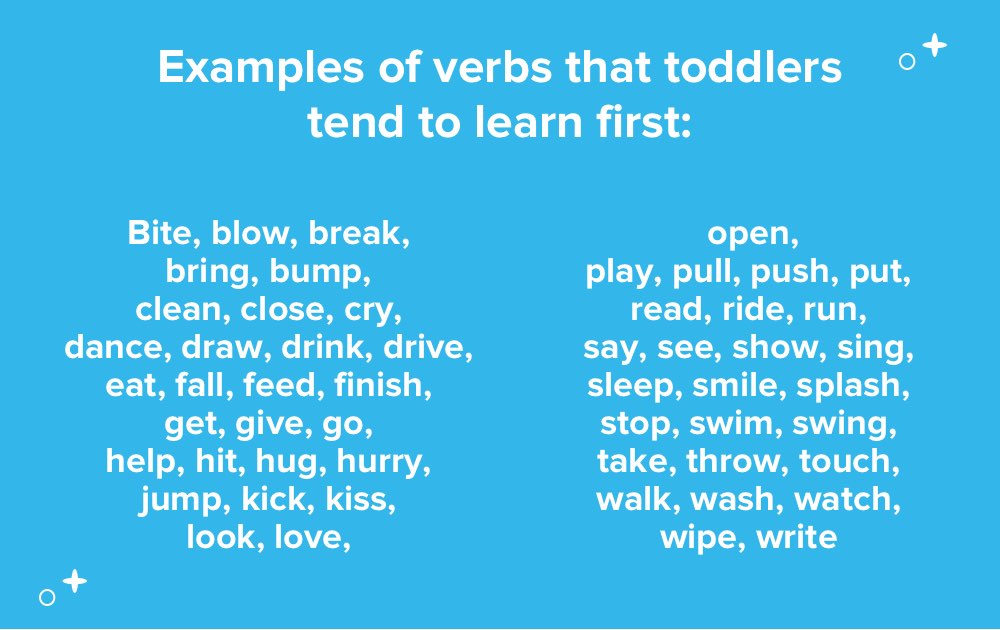Verbs pave the way for your toddler's language development
It is such an exciting milestone when toddlers begin talking. If you have a toddler or have the opportunity to watch another develop, you would probably have noticed that their first words are (almost) always the names of people and/or things (nouns), like Mama, Dada, ball, car, bottle, dog.
But once your toddler can say a few common words, you need to begin to expand his vocabulary to include different kinds of words. Your toddler also needs to learn words for actions (verbs), locations (prepositions), and descriptions (adjectives/adverbs), so that he can combine these to form phrases.
Toddlers typically begin to produce phrases when their vocabularies are close to 50 words, which should happen between the ages of 18 and 24 months. It is almost impossible for your toddler to make the jump from words to phrases unless he has expanded his vocabulary to include verbs.
At a young age, verbs typically include actions that your toddler experiences daily, like go, come, wash, eat, or words for states like want, like, see.
Why Are Verbs So Important?
Verbs are essential for your toddler’s language development because it allows your toddler the ability to start using phrases, which is the first step to formulating small sentences. Every sentence needs a verb. And the choice of verb determines many of the grammatical forms in the sentence.
Research has shown that toddlers who use more verbs by 24 months of age have more advanced grammatical skills by the age of 3-years.
When Should Toddlers Start Using Verbs?
There is much variability when it comes to how many verbs toddlers should use, but they should say at least 40 verbs by the age of 24 months.
Should your toddler use fewer than 40 verbs by their second birthday, don’t panic. This delay should not be a cause for concern, as long as your toddler continues to learn several new verbs every month for the next six months.
However, toddlers who use no verbs at 24 to 30 months may be at risk for problems with language development. These toddlers will not be able to produce short phrases or sentences yet, as they can’t build phrases or sentences without verbs.
If they have any other risk factors for long-term language difficulty, it may be wise to seek advice from a speech and language therapist who can determine whether they need help to build their vocabulary.

How to Help Your Toddler Learn New Verbs
When you are modelling good language use for your toddler, you need to make sure you emphasize the verbs. It can be easy to find yourself only labelling pictures (e.g. ball, bear, book). But instead of only labelling items and pictures, try adding a verb.
Here are 8 top tips to help your toddler learn verbs:
- Keep a list of the verbs your toddler understands and says. Toddlers must understand a word before they can begin using it. Knowing what verbs your toddler understands will help you identify which verbs you might repeat regularly to help him learn to say them. And keeping track of the verbs, your toddler already says will help you to know if he is learning new verbs each month.
-
Think about things your toddler likes to do. By identifying toys, foods, and activities your toddler enjoys, you will be able to think of action words (verbs) associated with these things. For example:
- If your toddler enjoys bath time, you could repeat verbs like “wash”, “pour” or “splash” when he has a bath.
- If your toddler likes to play with dolls, you could use verbs like” sleep ”, “feed”, or “cry” when you play together.
- While playing with cars, you can use verbs like “push”, “stop”, “go” and “drive”.
- Show your toddler what the verb means. Verbs are action words, so whenever possible, try to perform the action while you say the verb in a short phrase or sentence. For example, If you are helping your toddler learn the verb “jump”, make sure you jump up and down while you say “I jump. Jump, jump, jump. Mommy jumps high.” This will help your toddler remember the new word and what it means.
- Repeat, repeat and repeat some more! Your toddler needs to hear new words many times before he will start using the new word. When interacting with your toddler, try to use a new verb several times during the activity. Then use it again the next time you do that same activity. Then use it again when you do a different activity with your toddler. For example, if you’ve been emphasizing the verb “pour” every night at bath time, remember to use it at mealtimes when you pour a glass of milk. In this way, your toddler will have many opportunities to hear the new verb in a variety of situations.
- Make the verbs stand out when you use them. Other than repeating the verbs, make them stand out by exaggerating your intonation and slowing down a bit. For example, “Mommy EATS. Mommy eats the apple. I love EATING my apple.”
- Use self-talk. Describe what you are doing while you are doing it. For example, “Let’s wash your hair. Wash your face. Now, let’s wash your legs.”
- Use parallel talk. Imitate your toddler’s actions and talk about what he is doing. For example, if your toddler rolls out some playdough, you can imitate him by getting another rolling pin, and talking about the actions that he is performing. For example, “Roll the dough. Roll, roll, roll. Oh, now you smell the dough. Let mommy smell it too.”
-
Expand what your toddler says. If your toddler continues to use a single word and not use phrases or a short sentence, you can expand what he is saying by using his word(s) in a phrase and adding a verb. For example:
- If your toddler says “Bird.”, you could say “Bird flies.”
- If your toddler wants to play ball and says “Ball”, you could say “Play ball.” Or “Let us play ball.”.
The rule of thumb is to always repeat what your toddler said and add at least one more word. In this way, you acknowledge and encourage your toddler, but also provide an example that is one small step ahead and that he can learn from.
Toddlers need to learn all kinds of words in order to talk. Verbs are especially important because they help toddlers communicate about events in the world by combining words into phrases and sentences. By using some of the tips above, you can assist your toddler in learning verbs and paving the way for his language to develop.
Share this
- 0
- 0
Related Posts
Have you tried the Nubabi Free Trial?
Get unlimited access to Your Parenting Toolkit for 2 weeks for free!
Track, Boost, Explore and Capture your child's growth and development.
Available on both mobile and web.




